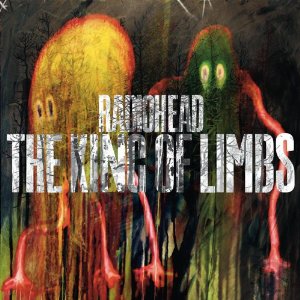
Radiohead are in control. They’re in control of when you get their music and how you get their music. Try making sense out of some of the unintelligibly brilliant vocals of Thom Yorke and you might find yourself frustrated, but as if by magic, key lyrics well up from to the depths of each track to the surface, as if for emphasis. Control.
The non-artistic side of Radiohead Inc. is not immune to total control either. It is a strange twist of fate that by refusing to participate in virtually any interaction with the media they are, in essence, in total control over how they are presented. That is, everything they do is seemingly shrouded in mystery, so by opting out of any media participation they only reinforce their mysterious image and thereby control that too. Chewed up and spit out by the hype machine early on in their career, somewhere an undergraduate psychology major must be having a field day with a dissertation on applying Freudian analysis to Radiohead’s dealings with the media from Pablo Honey to the present.
It is tough to separate that sort of “posturing by omission” from the actual music contained on their eighth studio album. It is also a shame, because as with In Rainbows, evaluating The King Of Limbs leads to a narrative that is as much about how the album is disseminated as it is about the music contained therein. With In Rainbows, the narrative was about the “pay what you will” approach to the sale of the album. These narratives only serve to obscure the fact that even late in their career, Radiohead are still revolutionary. Not Revolutionary with a capital R like OK Computer was, but with a more subtle lower case r that seems to get muddled by their closely guarded distribution choices and the attention given to them. With The King Of Limbs, the narrative has been about the return of the collective listening experience, the rare day where the anticipation of running to the record store to pick up a coveted album consumes us and all we can think about is running home to throw on our headphones to listen to our precious new copy over and over again.
This really begs the question though, does anybody under the age of 35 really long for those days, or remember them in the first place? And if you do, why would you want to go back to them? To paraphrase James Murphy, this is borrowed nostalgia for the unremembered nineties. There is no romance in memories circa 1994 of lugging around 100 discs in a cumbersome binder to the local Borders to add Pearl Jam’s Vitalogy to the fold. Maybe you were lucky enough to lug that binder to an excellent independent record store. Maybe the camaraderie of sitting in your high school buddies basement bunker and hearing “Corduroy” for the first time with all of your friends still holds meaning for you. I highly doubt if those experiences are still available in the collective sense though because the way in which music is distributed, purchased (or pirated), formatted, and consumed has changed so fundamentally and in such a short time it has made popular music a much more fractured and self curated exercise to say the least.
If there were ever an album to lend itself, aurally speaking, to the fractured landscape that is the music business circa 2011, The King Of Limbs is it. Clocking in at a mere 37 minutes, it is full of the scattershot electronics, beyond manipulated guitars, and eerie falsetto that you would expect from Radiohead. Unfortunately, it also is lacking anything in the way of the transcendent moments that are a feature of their best work. There is no “Subterranean Homesick Alien” or “Pyramid Song” to bind the album together. Instead it is merely solid, which is no sin unless you happen to inhabit the rarefied air that Radiohead resides in.
What is really striking about TKOL is the extent to which Thom Yorke’s vocals underpin and enhance its instrumentation. It is not so much what he is singing about but rather the varied intonation and melody that he applies to each track. Without this approach, if it was instead an instrumental album, they would be an excellent English answer to Tortoise or early Broken Social Scene. When Yorke sings “You’ve got some nerve, coming here” in the beginning to “Morning Mr. Magpie,” it is the vocal equivalent to Miles Davis’ trumpet entering the fray in “Pharaoh’s Dance.” He might have had eminently talented players all around him but it was Davis’ trumpet that established the melody and tenor of each song and on TKOL, Yorke is no different. It is a strikingly different approach to song construction than that of any other prominent band in rock and roll today, the lower case r if you will. Listen to the haunting falsetto of “Lotus Flower” or the looped incantations of “Give Up The Ghost” for more evidence of the subtle brilliance of how his vocals drive these songs melodically. “Feral” (has there ever been a more appropriate title for a Radiohead track?) pushes that philosophy to its most extreme end with its cut up samples of Yorke’s moans and guttural utterances.
TKOL owes as much to Yorke’s vocals as it does to Phil Selway and Colin Greenwood, as it is equally dominated by ambitious drums and bass. From the amalgamated collection of loops that form the marching rhythm of “Bloom” to the closing shuffle of “Separator,” the clean complexity of Selway’s drumming really shines. On “Little by Little,” the baroque guitars obscure the fact that the drum beat is almost vaguely Brazilian, as if Selway had been spending time with Cyro Baptista. Characterizing this as Radiohead’s dub record wouldn’t be far off after absorbing the deep bass lines of “Lotus Flower,” “Bloom,” and “Separator.”
Lyrically, this is their most cryptic record since Kid A and also the area where they have grown a little stale. Tales of emptiness and alienation are well worn ground at this point in their career. This is also where we get back to the issue of control because only every so often do intelligible lyrical snippets make themselves obvious. I think this is by choice, to emphasize meaning of key phrases like “I’m such a tease and you’re such a flirt” from “Little by Little” or “There’s an empty space inside my heart” from “Lotus Flower.” Really anything I could try to quote and interpret here is probably misguided because your guess is as good as mine as to what is really being articulated at least 65% of the time.
“If you think this is over you are wrong” is one of the aforementioned key snippets that happens to bubble up during “Separator” with passable clarity, or at least clarity in Yorke’s world. If brevity is indeed the soul of wit, as another fairly prominent Englishman once intimated, then maybe the meager length of The King Of Limbs was just a clever way of releasing side one of a larger project. And maybe someday soon, Radiohead will unwittingly bestow another day of collective listening grandeur upon us. Somehow this would seem too obvious for a band that seems to revel in their calculated mysteriousness.



No Comments comments associated with this post